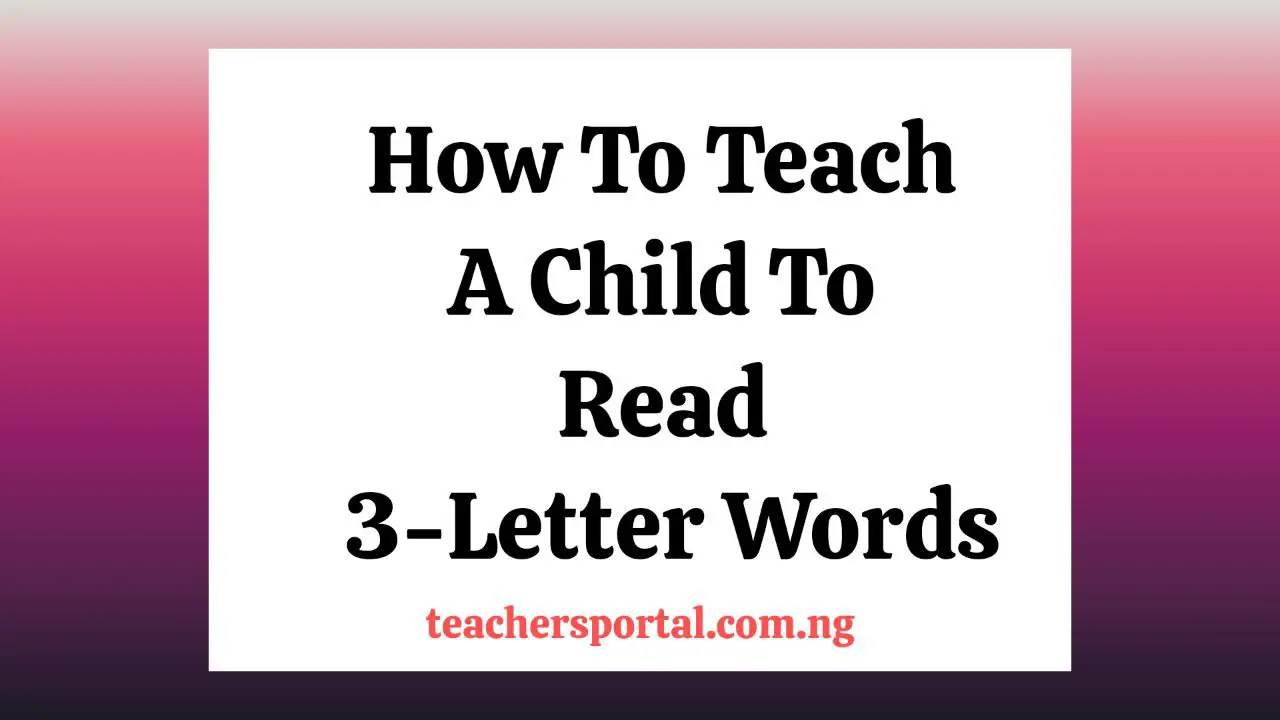Teaching a child to read is a monumental milestone that lays the foundation for their academic journey. One of the crucial steps in this process is introducing them to 3-letter words. These simple yet powerful words form the building blocks of language comprehension and fluency. In this article, we’ll explore a comprehensive approach to teaching children how to read 3-letter words.
Tips For Teaching Children How To Read 3-Letter Words
- Lay the Phonics Foundation
Phonics is the method of teaching reading by correlating sounds with letters or letter groups. Begin by introducing the child to the individual sounds of each letter in the alphabet. Utilize visual aids like alphabet charts, flashcards, or even educational apps that focus on phonics. Ensure the child understands the sounds each letter makes.
- Sound Blending
Once the child is familiar with the letter sounds, move on to sound blending. Demonstrate how to blend the sounds together to form simple words. For instance, with the letters “c,” “a,” and “t,” guide the child to say each sound – /k/ – /a/ – /t/ – and then blend them to say “cat.” Encourage them to practice this process repeatedly until they become comfortable with it.
- Introduction of 3-Letter Words
Start introducing 3-letter words that follow basic phonetic rules. Words like “cat,” “dog,” “bat,” “hat,” and “run” are excellent choices to begin with. Display these words visually, and guide the child to sound them out using the phonics skills they’ve learned. Gradually increase the complexity of the words as the child gains confidence.
- Repetition and Practice
Repetition is key to reinforcing the child’s learning. Use flashcards, word puzzles, and interactive games to make the learning process engaging. Create a variety of activities that involve reading and writing 3-letter words. The more exposure the child gets, the more confident they’ll become in recognizing and reading these words.
- Reading Material
Select reading materials specifically designed for early readers. Look for books with short sentences and ample repetition of 3-letter words. These books often have colorful illustrations that aid in understanding the context of the words. Gradually transition from reading aloud to the child to shared reading, where they actively participate in reading some of the 3-letter words.
- Encouragement and Patience
Each child learns at their own pace, so it’s important to be patient and encouraging. Celebrate their progress and achievements, no matter how small. Positive reinforcement will boost their confidence and motivation to continue learning.
- Contextual Learning
Help the child understand the meaning of the 3-letter words by using them in sentences. Connect the words to their everyday experiences. For example, if teaching the word “sun,” relate it to the bright object in the sky that provides light and warmth.
Examples of Three-letter Words
Below here are about twenty Three-letter Words commonly used by children:
- Cat
- Dog
- Hat
- Bat
- Run
- Sun
- Cup
- Pen
- Leg
- Pig
- Fox
- Jam
- Bed
- Car
- Bus
- Toy
- Egg
- Man
- Mom
- Dad
Steps On How To Teach A Child To Read 3 Letter Words
Here are procedures on how to teach a child to read 3-letter words:
- Start with the basics. Make sure your child knows the alphabet and the sounds that each letter makes. You can do this by singing songs, playing games, and making flashcards.
- Focus on CVC words. CVC words are words that have a consonant-vowel-consonant pattern. These are the easiest words for children to learn to read because they only have three sounds to blend together. Some common CVC words include: cat, dog, bed, cup, and hat.
- Use visuals. Children learn best by seeing and doing. When you’re teaching your child to read 3-letter words, use pictures to help them visualize the words. You can also use objects to represent the words. For example, if you’re teaching your child the word “cat,” you could show them a picture of a cat or give them a stuffed cat toy.
- Make it fun! Reading should be enjoyable for children. If they’re not having fun, they’re less likely to want to learn. So make sure to keep things light and fun when you’re teaching them to read 3-letter words. You can try using games, songs, and other activities to make learning fun.
- Be patient. It takes time for children to learn to read. Don’t get discouraged if your child doesn’t seem to be getting it right away. Just keep practicing and providing them with positive reinforcement. With time and patience, they’ll eventually get the hang of it.
Here are some additional guides that you may find helpful:
- Use a variety of teaching methods. Don’t just stick to one method of teaching your child to read three-letter words. Try a variety of methods to see what works best for them.
- Make sure your child is ready to learn. Not all children are ready to learn to read at the same age. Make sure your child is developmentally ready before you start teaching them to read 3-letter words.
- Get your child involved. The more involved your child is in the learning process, the more likely they are to succeed. Encourage them to ask questions and participate in activities.
- Celebrate your child’s successes. When your child learns a new word, be sure to celebrate their success. This will help them stay motivated and keep learning.
- I hope these tips help you teach your child to read three-letter words. Just remember to be patient and have fun!
Conclusion
Teaching a child to read 3-letter words is a foundational step towards building their reading skills. By focusing on phonics, sound blending, repetition, and engaging reading materials, parents and educators can provide a strong framework for language development. Remember, patience, encouragement, and a supportive learning environment are key factors in fostering a child’s love for reading and language
